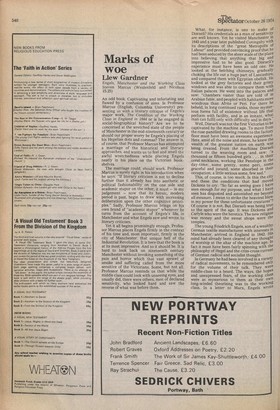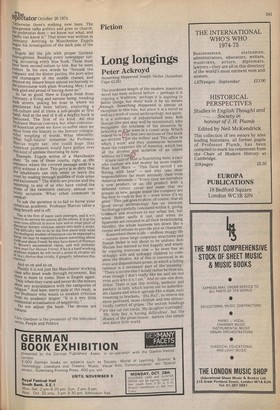Marks of woe
Llew Gardner
Engels, Manchester and the Working Class Steven Marcus (Weidenfeld and Nicolson £.5.25) An odd book. Captivating and infuriating and flawed by a confusion of aims. Is Professor Marcus (English, Columbia University) presenting us with a literary critique of Engels's major work, The Condition of the Working Class in England in 1844 or is he engaged in social-biographical history? Are we to be concerned at the wretched state of the people of Manchester in the mid-nineteenth century or should our proper worry be Engels's placing of his Hegelian dots and commas? The answer is, of course, that Professor Marcus has attempted a marriage of the historical and literary approaches, and wants us to feel and smell the awful wretchedness while placing Engels neatly in his place on the Victorian bookshelves.
The marriage could, should work. Professor Marcus is surely right in his introduction when he says: "If literary criticism is not to decline further than it already has into aesthetic or political fashionability on the one side and academic stupor on the other, it must — in my judgement — now that its heroic, modern period is past, begin to draw with increasing deliberation upon the other cognitive principles." Sadly, Professor Marcus brings on his own brand of "academic stupor" whenever he turns from the account of Engels's life in Manchester and what Engels saw and wrote, to literary criticism.
Yet it all begins promisingly enough. Professor Marcus places Engels firmly in the context of his time and, most important, firmly in the city of Manchester: that unique hell of the Industrial Revolution. It is here that the book is at its most impressive. And so it should be. It is hard to look back on nineteenth century Manchester without invoking something of the pain and horror which that vast sprawl of smoke and suffering called from the more sensitive of the Victorians. Some, but not all. Professor Marcus reminds us that while the middle class could look with unseeing eyes, and usually did, there were others, men of declared sensitivity, who looked hard and saw the reverse of what was before them.
What, for instance, is one to make of Disraeli? His credentials as a man of sensitivity are well known. Yet he visited Manchester in 1843 and a year later published Coningsby with its descriptions of the "great Metropolis of Labour" and provided convincing proof that he had been seduced by the sheer scale of the Place into believing that anything that big and impressive had to be also good. Disraeli's experience must have been an odd one. He looked at the belching chimneys, graduallY choking the life out a huge part of Lancashire, and compared them with Egyptian obelisk. He looked at the grey factories and their grimY windows and was able to compare them with Italian palaces. He went into the palaces and saw: "chambers vaster than are told of in Arabian fable, and peopled with habitants more wondrous than Afrite or Pen. For there he beheld, in long continued ranks, those mysterious forms full of existence without life that perform with facility, and in an instant, what, man can fulfil only with difficulty and in days. Well, Disraeli was not the first Victorian to be captivated by the machine age. To move from the rose-panelled drawing rooms to the factorY floor must have been an awesome experience. Here, amid all the noise and steam, he knew the wealth of the greatest nation on earth was being created. From the machines Disraeli turned to the weaving room and saw: s thousand or fifteen hundred girls . . . in their coral necklaces, working like Penelope in thefl day-time;,, some pretty, some pert, some graceful and jocund, some absorbed in their occupation; a little serious some, few sad." This, of course, is too much. Is this the citY and these the conditions that had moved Dickens to cry: "So far as seeing goes I have seen enough for my purpose, and what I have seen has disgusted and astonished me beyond all measure. I mean to strike the heaviest blo,W, in my power for these unfortunate creatures ? Of course it is not. But Disraeli was being true to the spirit of the age. It was Dickens and Carlyle who were the heretics. The new religion was money and the sweat shops were the temples.
The young Friedrich Engels, son of a wealthY German textile manufacturer with interests in Manchester, arrived in England in 1842. His mind had already been cleared of any thought of worship at the altar of the machine age. In fact it must have been fairly spinning with the philosophy of Hegel and the criss-cross current of German radical and socialist thought.
In Germany he had been involved in a variety of radical movements, to be remembered onlY for the volume of their talk. They were middle-class to a beard. The ways, the hopes and unexpressed fears, of the working class were as mysterious to them as their own long-winded theorising was to the working class. In a letter to Marx, Engels wrote Otherwise there's nothing new here. The bourgeoisie talks politics and goes to church; the proletariat does – we know not what, and hardly can know it." That letter was written in Germany. Arriving in Manchester Engels began his investigation of the dark side of the moon.
Engels did the job with proper German thoroughness. Reading every newspaper cutting, devouring every blue book. These must .0ave been second nature to him. But he went further. In his own words he "forsook the Company and the dinner parties, the port-wine and champagne of the middle classes, and devoted my leisure hours almost exclusively to the intercourse with plain Working Men; I am bath glad and proud of having done so." So far so good. Here is Engels fresh from Germany, a living and earnest being, treading dark streets, poking his nose in where no gentleman had been before, exploring a sub-culture and at times a sub-people at first hand. And at the end of it all a mighty book is :and.
The first of its kind. All this
rrofessor Marcus conveys, but what convoluted American prose we have to. suffer once we Move from the history to the literary critique. What weighing of words. What obscurity. What high-falutin' nonsense. As Professor Marcus might say: one could hope that American professors would have gotten over this kind of aimless theorising by now.
Example. Engels writes of a Manchester
Slum: "In one of these courts, right at the entrance where the covered passage ends is a ,P,rivY without a door. This privy is so dirty that 'fte inhabitants can only enter or leave the Court by wading through puddles of stale urine and excrement." The words are precise and the re, Porting, to any of us who have visited the slums of the twentieth century, almost certainly accurate. What other comment is needed?
To ask the question is to fail to know your Anierican academic. Professor Marcus takes a deep breath and is off: This is the first of many such passages, and it will have to do service for almost all the others. It is at the rrne time difficult to know how and at what pitch of ourse literary criticism enters into such a scene. ,',ruS difficulty has to do in the first place with what re intelligent student of literature can be expected to na.w. He may be expected to know something about .?,wift and about Freud; he may have heard of Norman ;_-) Brown's excremental vision, and will probably naVe read Our Mutual Friend: if he is a hard working ogfraduate student he will recall a scene in chapter six
Mary
rial.Barton that vividly, if gingerly. rehearses this tnate And so on and so on.
, Plainly it is not just the Manchester working ,class who must wade through excrement. But `h_ere is more to come. Here is Engels again: Only when they curse and swear do the miners Show any acquaintance with the categories of
And here, merry quip at the ready, is par Professor who wants to awaken criticism troM its academic stupor: "It is a wry little existential actualisation of negativity." 00 not adjust the book. The snores are natural.
Llew Gardner is the presenter of the television series, People and Politics











































 Previous page
Previous page